Garden therapy helps veterans heal from PTSD by leveraging nature’s innate calming effects on the brain. You’ll experience reduced stress responses and anxiety through sensory engagement with plants, water features, and natural environments. Accessible tools with ergonomic designs make gardening possible despite physical limitations, while raised beds minimize strain. The communal aspect creates valuable peer connections and shared purpose. Discover how thoughtfully designed green spaces can transform trauma into growth and renewed purpose.
The Science Behind Nature’s Healing Effect on Combat Trauma

While the effects of combat trauma can be devastating for veterans, emerging research suggests that nature offers powerful healing properties for those suffering from PTSD. This isn’t just anecdotal—the biophilic hypothesis indicates humans have an innate tendency to connect with nature, making it inherently therapeutic.
When you spend time in natural settings, your brain experiences positive neurobiological changes in regions responsible for stress and anxiety. These environments reduce your automatic physical reactions associated with PTSD while promoting relaxation and psychological well-being. Studies have shown that veterans participating in peer-led experiences reported significant improvements in psychological well-being after outdoor camping trips.
Nature’s restorative effects provide you with new coping strategies to manage triggering situations. Though benefits are often person-specific—meaning your ideal natural therapy might differ from another veteran’s—the science increasingly supports nature’s role in mitigating trauma’s psychological impact, warranting further research into these biological connections.
Accessible Garden Tools Designed for Veterans With Physical Limitations
Adaptive hand tools with cushioned grips and extended handles allow you to garden without taxing your joints or exacerbating old injuries.
Raised garden beds eliminate the need to bend or kneel, putting less stress on your back and legs while keeping your favorite plants within easy reach.
You’ll find ergonomically designed tools reduce hand fatigue and prevent muscle strain, enabling longer periods of therapeutic gardening without discomfort.
These specialized gardening solutions are particularly valuable as they support physical disabilities with modifications that make nurturing plants accessible to all veterans regardless of mobility challenges.
Adaptive Hand Tool Solutions
Accessibility forms the cornerstone of successful therapeutic gardening programs for veterans with physical limitations.
You’ll find specialized tools with ergonomic grips that reduce strain if you have limited hand strength, while non-slip surfaces enhance safety in all conditions.
For veterans with limb differences or amputations, prosthetic-compatible handles and tools with wrist straps provide stability when hand function is impaired.
You can also benefit from lightweight materials like aluminum that minimize fatigue during extended gardening sessions.
Battery-powered options lower physical exertion if you’re dealing with strength limitations, while modular attachments let you switch between digging, planting, and pruning without changing tools.
These adaptive solutions don’t just make gardening possible—they transform it into an empowering activity that supports your therapeutic journey through mindfulness and accomplishment.
Raised Bed Advantages
Raised beds represent a game-changing design element in therapeutic gardening for veterans with physical challenges. You’ll find these elevated growing spaces offer comfortable access without straining your back or knees—critical for those managing mobility issues or chronic pain from service-related injuries. Nature serves as an ideal environment for veterans to process therapeutic advice while working with these accessible garden designs.
| Benefit | Physical Impact | Therapeutic Value |
|---|---|---|
| Adjustable Height | Reduces bending strain | Increases independence |
| Improved Access | Minimizes physical barriers | Builds confidence |
| Enhanced Soil Control | Requires less physical effort | Creates visible results faster |
These customizable gardens can be tailored to your specific needs, whether you’re using a wheelchair or managing balance issues. The contained design also makes maintenance simpler, allowing you to focus on the therapeutic aspects of nurturing plants rather than struggling with accessibility challenges.
Ergonomic Design Benefits
For veterans coping with physical limitations, ergonomic garden tools represent far more than mere equipment—they’re gateways to independence.
These specialized tools minimize strain on joints and muscles through thoughtful design features like padded grips, extended handles, and balanced weight distribution.
You’ll find these tools crafted from lightweight materials that reduce fatigue during extended gardening sessions. Their textured grips prevent slippage while handles conform to your hand’s natural shape. Some even offer adjustable features to match your specific needs. These adaptations serve the core purpose of therapeutic gardens by facilitating meaningful people-plant interactions despite physical challenges.
The benefits extend beyond physical comfort. When you’re not fighting pain or discomfort, you can focus on the therapeutic aspects of gardening.
This enhanced comfort reduces injury risk while improving productivity and mental well-being—crucial elements in PTSD recovery. Combined with accessible garden layouts featuring wide pathways and strategic seating areas, these ergonomic tools create truly healing environments.
Creating Sensory Gardens That Ground PTSD Symptoms
When designed thoughtfully, sensory gardens offer veterans with PTSD a powerful grounding experience that engages all five senses simultaneously. These environments incorporate elements like fragrant plants, textured pathways, and water features that create a multisensory healing space. Nature exposure through these gardens actively contributes to improved mood and overall mental wellness.
| Sense | Garden Elements | Therapeutic Benefit |
|---|---|---|
| Sight | Colorful plants, lighting | Improves mood in 96% of participants |
| Sound | Wind chimes, water features | Reduces anxiety and stress |
| Touch | Textured paths, diverse plants | Creates physical grounding points |
You’ll find these gardens are designed for tranquility rather than just aesthetic appeal. The combination of accessible paths, strategic seating areas, and carefully selected plants creates a safe environment where you can manage symptoms while building community connections with fellow veterans.
Ergonomic Equipment That Supports Therapeutic Garden Sessions
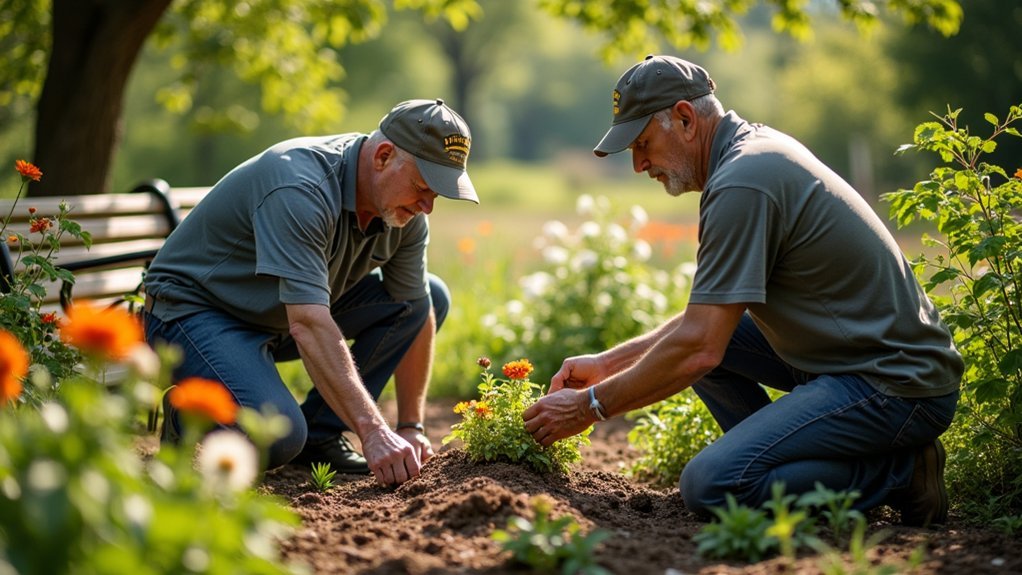
You’ll find that specially designed adaptive gardening tools can considerably reduce physical strain while allowing veterans to fully engage in therapeutic activities.
Garden spaces built with accessibility as the priority feature smooth pathways, height-adjustable planters, and strategically placed rest areas that accommodate mobility challenges.
These thoughtful design elements work together to create an environment where the healing benefits of gardening aren’t hindered by physical limitations. The physical health benefits of agritherapy include improvement in cardiovascular health and muscle strength through the gentle but consistent activity of gardening.
Adaptive Gardening Tools
Therapeutic gardening sessions become markedly more effective when veterans have access to specially designed adaptive equipment.
These tools help overcome physical limitations while enhancing the healing process.
You’ll find grip-aids and ergonomic handles particularly valuable if you’re experiencing reduced hand strength or mobility issues.
Tools with extended or angled handles allow you to garden without straining your back, while lighter equipment reduces fatigue during therapy sessions.
Smart gardening tools can track your progress, providing encouraging feedback as you develop new skills.
Multi-functional tools serve several purposes, maximizing your efficiency while minimizing frustration.
Specialized equipment that facilitates gardening activities creates an environment that promotes attention restoration and helps rebuild cognitive resources damaged by trauma.
Your therapist can help customize tools to address your specific needs, whether that’s incorporating weighted handles for improved balance or selecting materials that absorb shock to protect sensitive joints.
Accessibility-Focused Garden Design
The accessibility of the garden itself complements adaptive tools by creating an environment where healing can flourish unimpeded.
When you’re battling PTSD, a thoughtfully designed therapeutic garden removes barriers that might otherwise trigger stress or anxiety.
Gardens built with veterans in mind feature wide pathways for wheelchairs, raised beds that eliminate bending strain, and ergonomic layouts that minimize physical effort while maximizing engagement with nature’s healing elements. Landscape designers often collaborate with horticultural therapists to ensure these spaces effectively address the unique needs of veterans with PTSD.
- Sensory-rich zones – Areas with fragrant herbs, textured plants, and soothing water features engage multiple senses to ground you during flashbacks.
- Flexible use spaces – Adaptable areas that accommodate different mobility levels, group therapy sessions, or solitary reflection.
- Safety-conscious elements – Non-toxic plants, clear sightlines, and smooth shifts between garden sections reduce hypervigilance triggers.
Building Community Through Veteran Garden Programs
While traditional therapy often occurs in isolated clinical settings, veteran garden programs create vibrant communities where healing happens collectively. You’ll find yourself working alongside fellow veterans on shared tasks like planting, harvesting, and maintenance, naturally building trust and camaraderie without forced interactions.
| Program Element | Community Benefit |
|---|---|
| Scheduled Sessions | Creates routine and accountability among participants |
| Group Tasks | Fosters teamwork and shared accomplishment |
| Peer Support | Develops natural mentoring relationships |
These programs provide a structured environment where you’re encouraged to initiate activities and take ownership of projects. The combination of skilled facilitators and peer connections creates a powerful support network that extends beyond garden boundaries, helping you shift from isolation to community engagement and reintegration.
From Battlefield to Garden: Real Success Stories
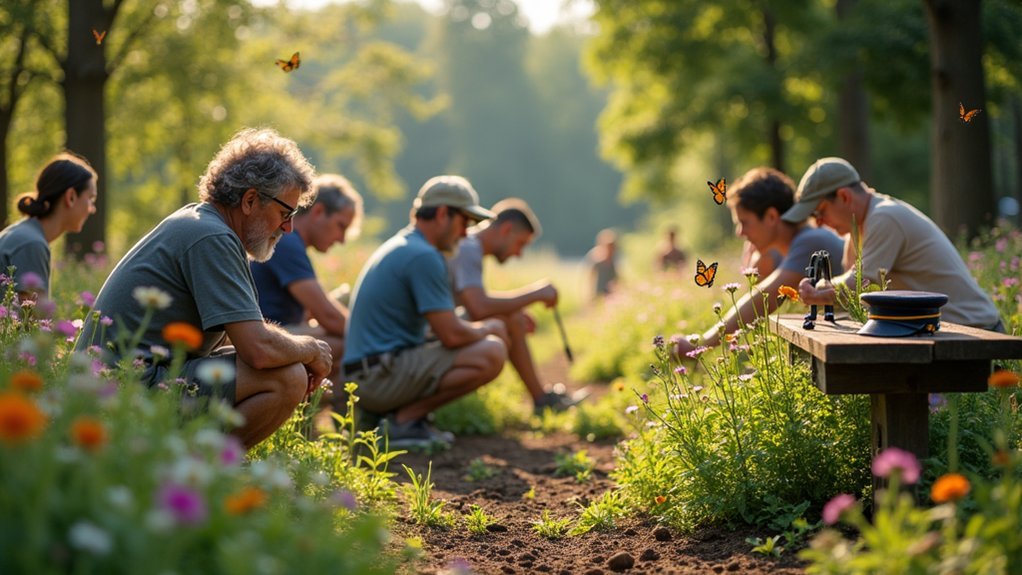
Transformed by soil and sunlight, combat veterans across the country are finding healing through garden therapy programs that address their deepest PTSD wounds.
Their testimonials reveal powerful transformations as they trade combat boots for gardening gloves and rifles for trowels.
- An Army veteran who struggled with debilitating anxiety found peace growing organic vegetables, reporting that the rhythmic tasks of planting and harvesting grounded him when flashbacks threatened.
- Veterans experiencing chronic pain discover that working with soil provides natural relief while giving them purpose beyond their diagnosis.
- Those who participated in long-term gardening programs developed sustainable coping strategies, reducing their dependence on medication while improving sleep patterns through regular exposure to natural light.
The War Garden Project in Fort Campbell, Kentucky has been helping veterans since 2012, providing therapeutic environments where nature becomes an ally in their recovery journey.
Seasonal Planting Strategies for Year-Round Therapeutic Benefits
Beyond personal victories in veteran garden therapy programs lies a carefully designed approach to healing that spans all twelve months.
You’ll find spring’s sensory-rich environment with fragrant herbs and colorful bulbs providing early accomplishment and mood enhancement.
Summer brings opportunities to improve dexterity through vegetable cultivation while benefiting from vitamin D and cooling shade spaces.
As autumn arrives, you can experience closure through harvest activities and garden preparation, while engaging with seasonal plants promotes reflection on life’s changes.
Winter doesn’t pause the healing—indoor succulents, cold-season crops, and greenhouse activities maintain nature connections during challenging months. These winter gardening activities can be particularly beneficial for veterans with PTSD, as they encourage grounding techniques that help reconnect with the present moment.
Year-round engagement through garden calendars, diverse plantings, and off-season crafts guarantees your therapeutic journey continues regardless of weather, providing consistent structure for processing trauma and building resilience.
Adaptive Gardening Techniques for Various Mobility Challenges

For veterans facing mobility limitations, therapeutic gardening adapts to meet their unique physical needs rather than asking them to conform to standard practices.
Gardens designed with wheelchair accessibility feature raised beds positioned at ideal heights, while wide pathways guarantee unobstructed movement for those using mobility aids.
Specialized equipment transforms gardening into an accessible activity regardless of physical challenges:
- Ergonomic tools with cushioned, extendable handles reduce strain on joints and minimize bending
- Lightweight equipment with leveraged designs requires less strength while maintaining functionality
- Automated irrigation systems eliminate the need for heavy watering cans and hoses, making garden maintenance manageable
These adaptations allow veterans to experience the therapeutic benefits of gardening while honoring their bodies’ current capabilities and limitations. The physical activity involved provides low-impact exercise that gradually improves strength and coordination for veterans recovering from injuries.
Frequently Asked Questions
How Long Does Garden Therapy Take to Show Results for PTSD?
You’ll typically begin seeing results from garden therapy for PTSD within 6-8 weeks. Some benefits emerge after just a few sessions, while full therapeutic effects develop over the standard 12-week program.
Can Indoor Gardening Provide the Same Benefits as Outdoor Gardens?
While indoor gardening offers significant benefits like stress relief and accessibility, you won’t get the full sensory experience and nature exposure that outdoor gardens provide. Both can help, but they deliver different therapeutic advantages.
Are There Insurance Coverage Options for Horticultural Therapy Programs?
Insurance coverage for horticultural therapy is limited. You’ll find VA programs offer support, while traditional insurance rarely covers it. Look into community programs, government funding, and grants for affordable access options.
How Do Family Members Support Veterans in Garden Therapy?
Your family can strengthen your garden therapy by offering emotional encouragement, helping with physical tasks, joining you in activities, building community connections, and supporting healthy eating habits using your harvested produce.
What Qualifications Should Horticultural Therapists Have for Treating Veterans?
For treating veterans, you’ll need a bachelor’s degree in horticultural therapy or related field, professional certification from AHTA, trauma-informed care training, and practical experience implementing therapeutic gardening programs for PTSD management.
In Summary
You’ve discovered gardening isn’t just a hobby—it’s medicine for wounded warriors. Whether you’re designing sensory spaces, using adaptive tools, or joining community plots, you’re healing through connection with earth and others. Your hands that once carried weapons now nurture life, creating tangible proof of growth and renewal. As you tend to your garden, you’re also tending to your soul, finding peace one plant at a time.

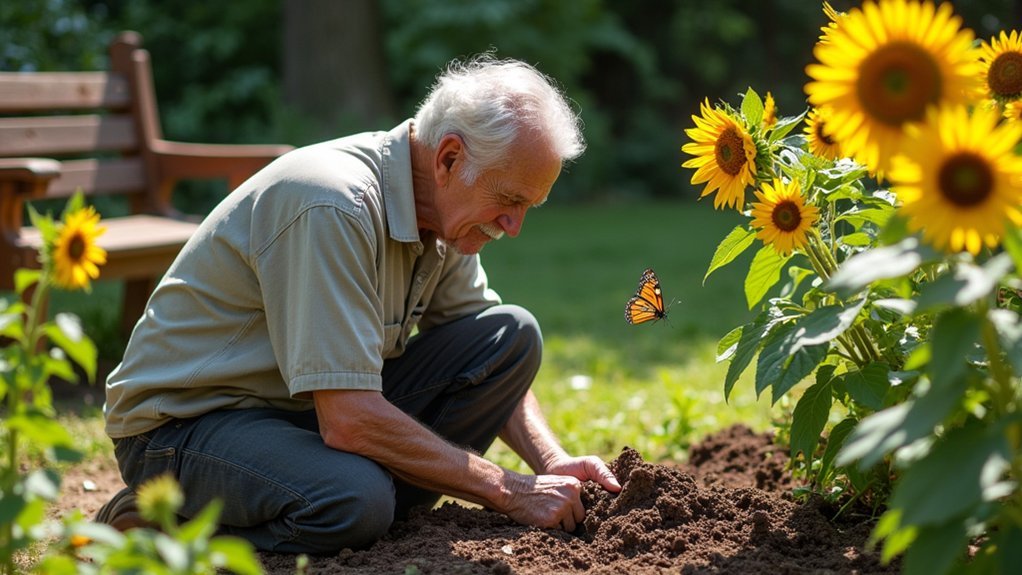
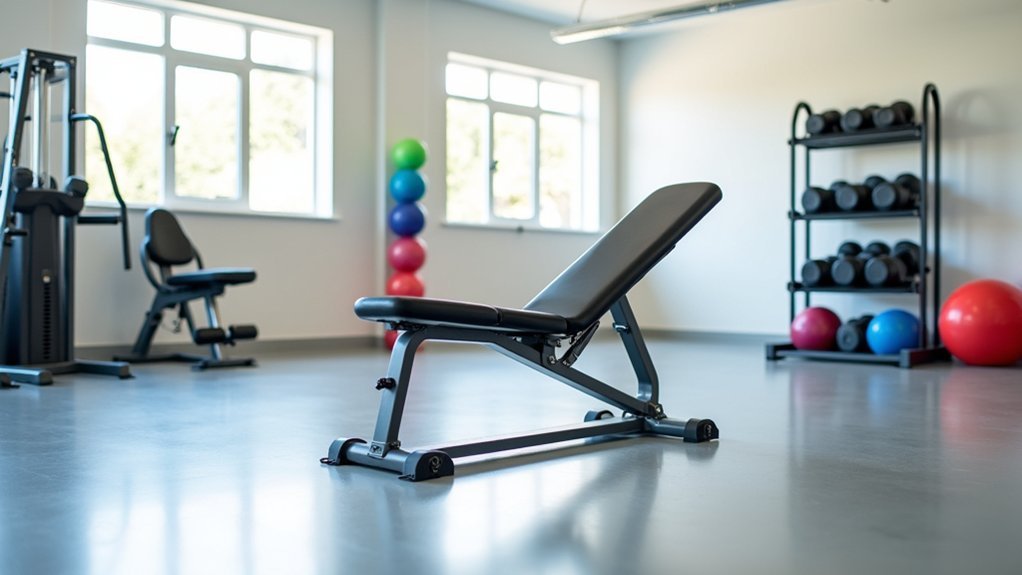
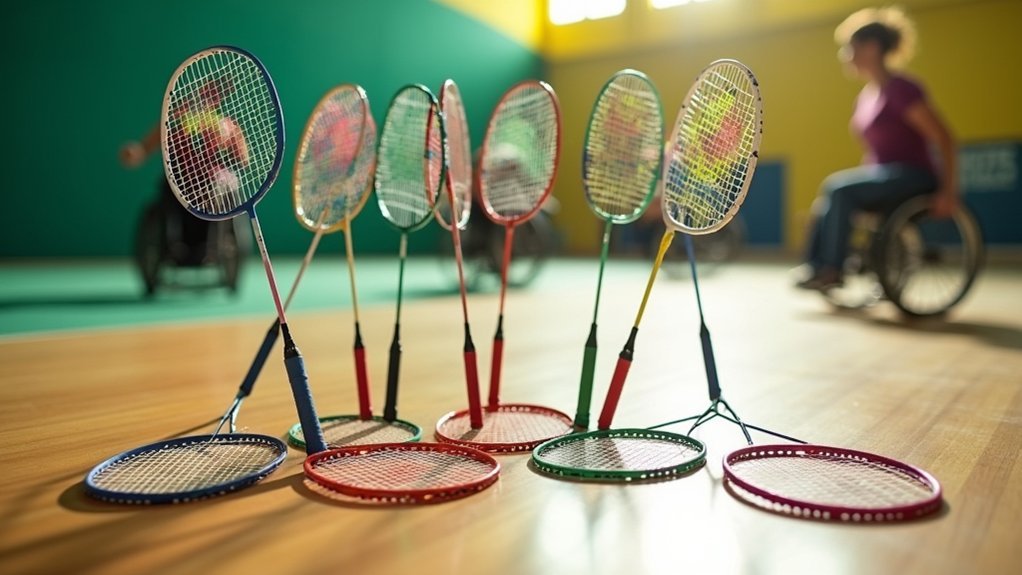
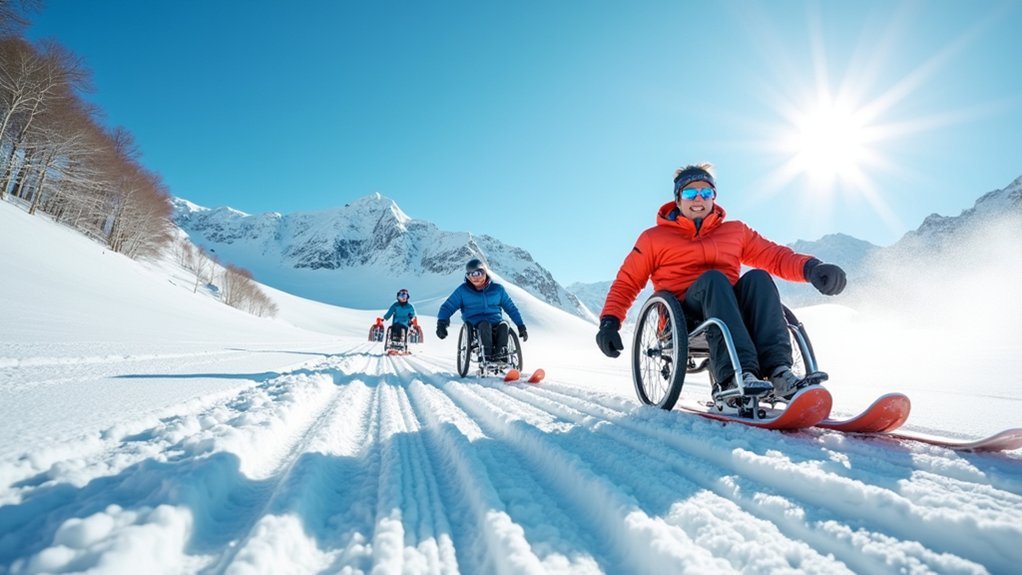
Leave a Reply